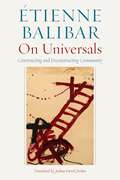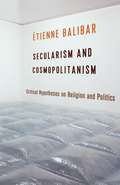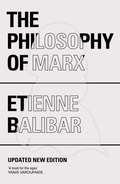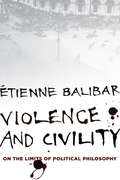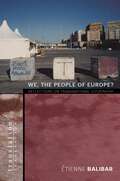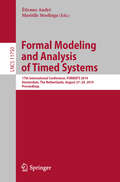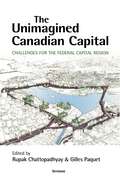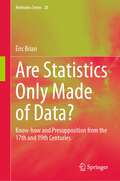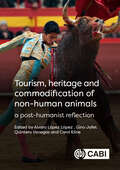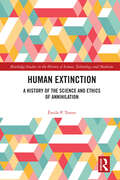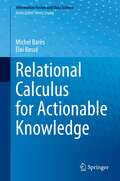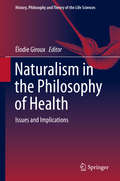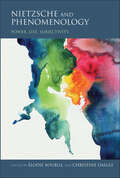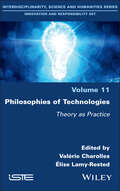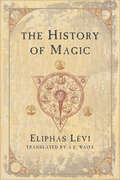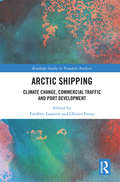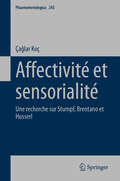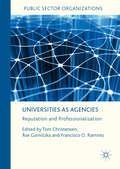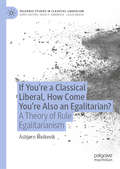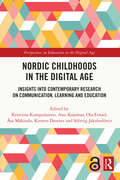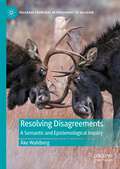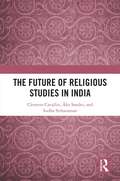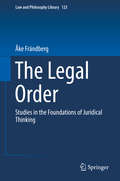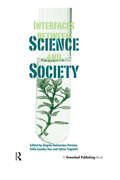- Table View
- List View
On Universals: Constructing and Deconstructing Community (Commonalities)
by Étienne BalibarMany on the Left have looked upon “universal” as a dirty word, one that signals liberalism’s failure to recognize the masculinist and Eurocentric assumptions from which it proceeds. In rejecting universalism, we have learned to reorient politics around particulars, positionalities, identities, immanence, and multiple modernities. In this book, one of our most important political philosophers builds on these critiques of the tacit exclusions of Enlightenment thought, while at the same time working to rescue and reinvent what universal claims can offer for a revolutionary politics answerable to the common.In the contemporary quarrel of universals, Balibar shows, the stakes are no less than the future of our democracies. In dialogue with such philosophers as Alain Badiou, Judith Butler, and Jacques Rancière, he meticulously investigates the paradoxical processes by which the universal is constructed and deconstructed, instituted and challenged, in modern society. With critical rigor and keen historical insight, Balibar shows that every statement and institution of the universal—such as declarations of human rights—carry an exclusionary, particularizing principle within themselves and that every universalism immediately falls prey to countervailing universalisms. Always equivocal and plural, the universal is thus a persistent site of conflict within societies and within subjects themselves.And yet, Balibar suggests, the very conflict of the universal—constituted as an ever-unfolding performative contradiction—also provides the emancipatory force needed to reinvigorate and reimagine contemporary politics and philosophy. In conversation with a range of thinkers from Marx, Freud, and Benjamin through Foucault, Derrida, and Scott, Balibar shows the power that resides not in the adoption of a single universalism but in harnessing the energies made available by claims to universality in order to establish a common answerable to difference.
Secularism and Cosmopolitanism: Critical Hypotheses on Religion and Politics (European Perspectives: A Series in Social Thought and Cultural Criticism)
by Étienne BalibarWhat is the relationship between cosmopolitanism and secularism—the worldwide and the worldly? While cosmopolitan politics may seem inherently secular, existing forms of secularism risk undermining the universality of cosmopolitanism because they privilege the European tradition over all others and transform particular historical norms into enunciations of truth, valid for all cultures and all epochs. In this book, the noted philosopher Étienne Balibar explores the tensions lurking at this troubled nexus in order to advance a truly democratic and emancipatory cosmopolitanism, which requires a secularization of secularism itself.Balibar argues for the idea of the universal against its particular dominant institutions. He questions the assumptions that underlie popular ideas of secularism and religion and outlines the importance of a new critique for the contemporary world. Balibar holds that conflicts between religious and secular discourses need to be reframed from a point of view that takes into account the cultural hybridization, migration and mobility, and transformation of borders that have reshaped the postcolonial age. Among the topics discussed are the uses and misuses of the category of religion and the religious, the paradoxical genealogy of monotheism, French laïcité’s identitarian turn, and the implications of the responses to the Charlie Hebdo attacks for an extended definition of free speech. Going beyond circumscribed notions of religion and the public sphere, Secularism and Cosmopolitanism is a profound rethinking of identity and difference that seeks to make room for a renewed political imagination.
The Philosophy of Marx
by Gregory Elliott Chris Turner Étienne BalibarA rich and accessible introduction to Marx’s fundamental concepts from a key intellectual—now updatedWritten by one of political theory’s leading thinkers, The Philosophy of Marx examines all the key areas of Marx’s writings in their wider historical and theoretical context—including the concepts of class struggle, ideology, humanism, progress, determinism, commodity fetishism, and the state. Etienne Balibar opens a gateway into the thought of one of history’s great minds. In this updated edition to this now classic work, Balibar has added a substantial introduction and new material. Complete with key “information boxes” for the student to make the most challenging areas of theory easy to understand, this remains the best available introduction to the most important thinker of the past 200 years.
Violence and Civility: On the Limits of Political Philosophy (The Wellek Library Lectures)
by Étienne BalibarIn Violence and Civility, Étienne Balibar boldly confronts the insidious causes of violence, racism, nationalism, and ethnic cleansing worldwide, as well as mass poverty and dispossession. Through a novel synthesis of theory and empirical studies of contemporary violence, the acclaimed thinker pushes past the limits of political philosophy to reconceive war, revolution, sovereignty, and class.Through the pathbreaking thought of Derrida, Balibar builds a topography of cruelty converted into extremism by ideology, juxtaposing its subjective forms (identity delusions, the desire for extermination, and the pursuit of vengeance) and its objective manifestations (capitalist exploitation and an institutional disregard for life). Engaging with Marx, Hegel, Hobbes, Clausewitz, Schmitt, and Luxemburg, Balibar introduces a new, productive understanding of politics as antiviolence and a fresh approach to achieving and sustaining civility. Rooted in the principles of transformation and empowerment, this theory brings hope to a world increasingly divided even as it draws closer together.
We, the People of Europe?: Reflections on Transnational Citizenship (Translation/Transnation #18)
by Étienne Balibarétienne Balibar has been one of Europe's most important philosophical and political thinkers since the 1960s. His work has been vastly influential on both sides of the Atlantic throughout the humanities and the social sciences. In We, the People of Europe?, he expands on themes raised in his previous works to offer a trenchant and eloquently written analysis of "transnational citizenship" from the perspective of contemporary Europe. Balibar moves deftly from state theory, national sovereignty, and debates on multiculturalism and European racism, toward imagining a more democratic and less state-centered European citizenship. Although European unification has progressively divorced the concepts of citizenship and nationhood, this process has met with formidable obstacles. While Balibar seeks a deep understanding of this critical conjuncture, he goes beyond theoretical issues. For example, he examines the emergence, alongside the formal aspects of European citizenship, of a "European apartheid," or the reduplication of external borders in the form of "internal borders" nurtured by dubious notions of national and racial identity. He argues for the democratization of how immigrants and minorities in general are treated by the modern democratic state, and the need to reinvent what it means to be a citizen in an increasingly multicultural, diversified world. A major new work by a renowned theorist, We, the People of Europe? offers a far-reaching alternative to the usual framing of multicultural debates in the United States while also engaging with these debates.
Formal Modeling and Analysis of Timed Systems: 17th International Conference, FORMATS 2019, Amsterdam, The Netherlands, August 27–29, 2019, Proceedings (Lecture Notes in Computer Science #11750)
by Mariëlle Stoelinga Étienne AndréThis book constitutes the refereed proceedings of the 17th International Conference on Formal Modeling and Analysis of Timed Systems, FORMATS 2019, held in Amsterdam, The Netherlands, in August 2019.The 15 full papers and 2 short papers presented in this volume were carefully reviewed and selected from 42 submissions. The papers are organized in the following topical sections: special session on data-driven and stochastic approaches to real-time, including monitoring and Big Data; timed systems; linear and non-linear systems; timed automata; special session on timed systems and probabilities.
The Unimagined Canadian Capital: Challenges for the Federal Capital Region
by Caroline Andrew Anne Gilbert Andrew Sancton André Juneau David L. Gordon Éric Champagne Guy Chiasson Meyer Burstein Almos TassonyiToo many stakeholders have neglected their duty of imagining an aspiring federal capital region for Canada. Under the auspices of the Forum of Federations, a number of persons interested in the fate of Canada’s federal capital region came together to examine the challenges facing the region and to put forward suggestions to deal with them.In this report on the brainstorming exercise conducted in January 2011, professionals, academics, and elected officials take stock of the vast array of assets on which the federal capital region can build; probe the many sources of failures in coping as effectively and creatively as one would expect with the diversity, trans-border, financial, and governance challenges; and make suggestions to ensure that the federal capital region does not remain “unimagined” in the future.
Are Statistics Only Made of Data?: Know-how and Presupposition from the 17th and 19th Centuries (Methodos Series #20)
by Éric BrianThis book examines several epistemological regimes in studies of numerical data over the last four centuries. It distinguishes these regimes and mobilises questions present in the philosophy of science, sociology and historical works throughout the 20th century. Attention is given to the skills of scholars and their methods, their assumptions, and the socio-historical conditions that made calculations and their interpretations possible. In doing so, questions posed as early as Émile Durkheim’s and Ernst Cassirer’s ones are revisited and the concept of symbolic form is put to the test in this particular survey, conducted over long period of time. Although distinct from a methodological and epistemological point of view, today these regimes may be found together in the toolbox of statisticians and those who comment on their conclusions. As such, the book is addressed to social scientists and historians and all those who are interested in numerical productions.
Tourism, Heritage and Commodification of Non-human Animals: A Posthumanist Reflection
by Alejandro Morales Carolin Funck Gustavo Ortiz-Millán Johan Edelheim Bobbie Chew Bigby Tomas Arias Jean Azcatl Pineda Alicia Mariana Pérez Émilie Crossley Georgina Flores Leonardo Garavito-González Yulei Guo Dr Jes Hooper Brenda Martínez Velasco Mateo Nicolás Medina Jorge Iván Barrera Javed Salim Estephania Sepúlveda Perdomo Rie Usui David A. Varela-Trejo Nusrat YasmeenHeritage is a social construction rooted in modern and contemporary societies. It is commonly a positive assessment of many elements of the physical and human environment (e.g. ecosystems and landscapes, monuments, customs, gender norms, religious practices, gastronomy, and livelihoods). Heritage and tourism are strongly related to each other in that heritage gives rise to tourist attractions and activities, and tourism enhances the designation of heritage sites. Non-human animals (hereafter 'animals') are present as implicit or explicit heritage elements through multiple tourist environments: animals may be themselves the heritage focus of tourist interest (visual arts, gastronomy, as charismatic and distinguished beings, as part of festivities or rituals), or it may be that animals are agents involved in heritage tourist environments such as working animals or in recreational activities. A post-humanist perspective the moral valuation of equality between humans and other animals demands that both are sentient beings and self-aware of their pain and pleasure. Thus, the involvement of animals as heritage elements by themselves or as an element of tourist consumption in heritage sites implies their commodification and lack of agency. As such, these practices are usually unethical, since they threaten the animals' primary interests: not to suffer, not to feel pain and to be able to live their freedom. This book contains chapters that reveal both the unethical interactions between humans and animals within heritage tourism, and those that show experiences in which efforts are made to minimize damage within the commercialization of animals involved as heritage themselves. It will be of interest to postgraduate students, academics, NGOs and tourism planners.
Human Extinction: A History of the Science and Ethics of Annihilation (Routledge Studies in the History of Science, Technology and Medicine)
by Émile P. TorresThis volume traces the origins and evolution of the idea of human extinction, from the ancient Presocratics through contemporary work on "existential risks." Many leading intellectuals agree that the risk of human extinction this century may be higher than at any point in our 300,000-year history as a species. This book provides insight on the key questions that inform this discussion, including when humans began to worry about their own extinction and how the debate has changed over time. It establishes a new theoretical foundation for thinking about the ethics of our extinction, arguing that extinction would be very bad under most circumstances, although the outcome might be, on balance, good. Throughout the book, graphs, tables, and images further illustrate how human choices and attitudes about extinction have evolved in Western history. In its thorough examination of humanity’s past, this book also provides a starting point for understanding our future. Although accessible enough to be read by undergraduates, Human Extinction contains new and thought-provoking research that will benefit even established academic philosophers and historians.
Relational Calculus for Actionable Knowledge (Information Fusion and Data Science)
by Éloi Bossé Michel BarèsThis book focuses on one of the major challenges of the newly created scientific domain known as data science: turning data into actionable knowledge in order to exploit increasing data volumes and deal with their inherent complexity. Actionable knowledge has been qualitatively and intensively studied in management, business, and the social sciences but in computer science and engineering, its connection has only recently been established to data mining and its evolution, ‘Knowledge Discovery and Data Mining’ (KDD). Data mining seeks to extract interesting patterns from data, but, until now, the patterns discovered from data have not always been ‘actionable’ for decision-makers in Socio-Technical Organizations (STO). With the evolution of the Internet and connectivity, STOs have evolved into Cyber-Physical and Social Systems (CPSS) that are known to describe our world today. In such complex and dynamic environments, the conventional KDD process is insufficient, and additional processes are required to transform complex data into actionable knowledge. Readers are presented with advanced knowledge concepts and the analytics and information fusion (AIF) processes aimed at delivering actionable knowledge. The authors provide an understanding of the concept of ‘relation’ and its exploitation, relational calculus, as well as the formalization of specific dimensions of knowledge that achieve a semantic growth along the AIF processes. This book serves as an important technical presentation of relational calculus and its application to processing chains in order to generate actionable knowledge. It is ideal for graduate students, researchers, or industry professionals interested in decision science and knowledge engineering.
Naturalism in the Philosophy of Health
by Élodie GirouxIna series of papers published in the 1970s, Christopher Boorse proposed anaturalist theory of health, mainly based on a value-free concept of'biological function', a concept of 'reference class' and the notion of'statistical normality'. His theory has profoundly shaped the philosophicaldebates on the concepts of health and disease. It could even be said that thenumerous criticisms of his 'biostatistical theory' are at the centre ofwhat is usually referred to as the debate between 'normativists' and'naturalists'. Today, the predominant naturalist theory of health is stillBoorse's biostatistical theory. Thisvolume offers the first comprehensive review and critical assessment of thenature and status of naturalism in the philosophy of health. It exploresthe notion of biological normativity and its relevance for the philosophy ofhealth, and it analyses the implications of the philosophical theories ofhealth for healthcare and the debate on health enhancement. Inthe first section, several contributions identify the kind of 'naturalism' thebiostatistical theory belongs to and offer further criticisms or possiblemodifications, such as the concept of function that is required by this theory,and whether a comparativist approach to health is more relevant than a non-comparativistone. The second section explores natural or biological 'normativity' and somepossible accounts of health that could be based on this concept. The third andfinal section focuses on the implications of naturalism in healthcare. 'Goalsof Medicine' is the first paper in which Christopher Boorse ventured toward analysingthe implication of his biostatistical theory of health on the practice ofmedicine, the difficult issue of the goals of medicine and the boundary betweentreating and enhancing. Other papers in this section critically evaluateBoorse's account and analyse the importance of a positive concept of health.
Nietzsche and Phenomenology: Power, Life, Subjectivity (Studies in Continental Thought)
by Élodie Boublil and Christine DaigleWhat are the challenges that Nietzsche's philosophy poses for contemporary phenomenology? Elodie Boublil, Christine Daigle, and an international group of scholars take Nietzsche in new directions and shed light on the sources of phenomenological method in Nietzsche, echoes and influences of Nietzsche within modern phenomenology, and connections between Nietzsche, phenomenology, and ethics. Nietzsche and Phenomenology offers a historical and systematic reconsideration of the scope of Nietzsche's thought.
Philosophies of Technologies: Theory as Practice
by Valérie Charolles Élise Lamy-RestedIn the space of a century, technologies have acquired unprecedented power. The result of these developments is a new form of the world. These transformations test our capacities and generate new crises with multiple issues at stake. Drawing on the lessons of a long history, Philosophies of Technologies examines the continuities and disruptions brought about by the power of contemporary technical systems, without reducing them to the digital age. It draws together 13 authors from different schools of thought and proposes tools that combine productive technology with sustainability, innovation and responsibility. This book wagers that, in the face of the sprawling and ever-changing deployment of technologies, philosophy is able to respond to the changes that offer so many opportunities to shape our future. Today, technologies need a philosophical moment.
Without Offending Humans: A Critique of Animal Rights (Posthumanities #24)
by Élisabeth de FontenayA central thinker on the question of the animal in continental thought, Élisabeth de Fontenay moves in this volume from Jacques Derrida&’s uneasily intimate writing on animals to a passionate frontal engagement with political and ethical theory as it has been applied to animals—along with a stinging critique of the work of Peter Singer and Paola Cavalieri as well as with other &“utilitarian&” philosophers of animal–human relations.Humans and animals are different from one another. To conflate them is to be intellectually sentimental. And yet, from our position of dominance, do we not owe them more than we often acknowledge? In the searching first chapter on Derrida, she sets out &“three levels of deconstruction&” that are &“testimony to the radicalization and shift of that philosopher&’s argument: a strategy through the animal, exposition to an animal or to this animal, and compassion toward animals.&” For Fontenay, Derrida&’s writing is particularly far-reaching when it comes to thinking about animals, and she suggests many other possible philosophical resources including Adorno, Leibniz, and Merleau-Ponty.Fontenay is at her most compelling in describing philosophy&’s ongoing indifference to animal life—shading into savagery, underpinned by denial—and how attempts to exclude the animal from ethical systems have in fact demeaned humanity. But Fontenay&’s essays carry more than philosophical significance. Without Offending Humans reveals a careful and emotionally sensitive thinker who explores the unfolding of humans&’ assessments of their relationship to animals—and the consequences of these assessments for how we define ourselves.
The History of Magic
by Éliphas LéviAn extensive classic work on the origins of ceremonial magic throughout the world&’s many cultures and religions. French occultists Alphones Louis Constant (1810–1875) was born in Paris to a shoemaker father. At age twenty-two, he entered the seminary at Saint Sulpice for an education that would prepare him for the priesthood. While he did become ordained a deacon, he found that his doubts regarding the doctrine of the Catholic Church precluded him from completing his ordination. A week before he was due to take orders as a priest, he left the Church and returned to civilian life. Through the 1850s and 1860s, Constant developed and disseminated his growing ideas of the occult, mysticism, and the Kabbalistic school of thought. He became a ceremonial magician and developed a social circle of other mystical and occultist thinkers. Eschewing the charlatan&’s tricks and parlor illusions, Lévi believed that the practice of ceremonial magic required a strong will, psychic force, and powerful imagination to discover true science and influence reality. And anyone who attempted to use magic for personal gain would lead to their own destruction. Writing under the name Éliphas Lévi—a literal translation of his name Alphonse Lewis into Hebrew—he began to share his ideas on magic with the public. In 1860, he began work on The History of Magic, an assessment and analysis of sacred magic through many past cultures. By exploring the magical components of the pagans, Kabbalists, ancient Greeks, Chinese, Indians, Catholics, and many other groups, Lévi sought to find the secret wisdom hidden within each. He also explored the secret traditions of the Illuminati, Freemasons, and the Knights Templar, among many others.The History of Magic is an essential test for any student of ceremonial magic, revealing the truths behind the fables, allegories, and parables of these cultural traditions. Translated into English by the British poet and mystic, A.W. Waite, it was published posthumously in 1913. Waite was one of the creators of the well-known Rider-Waite Tarot Deck, one of the most widely used tarot decks in the world.
Arctic Shipping: Climate Change, Commercial Traffic and Port Development (Routledge Studies in Transport Analysis)
by Édéric Lasserre Olivier FauryThis book considers both the present state of Arctic shipping and possible future trends with reference to the various sectors of maritime transportation: cruise tourism, container traffic and bulk shipping. Ports are analysed as tools that support the strategies of coastal states to foster the development of resource extraction, enhance the attractiveness of Arctic shipping lanes and enable the control of maritime activities through coast guard deployment. The aim of this book is to draw a picture of the trends of Arctic shipping. How is traffic evolving in Canada’s Arctic, or along the Northern Sea Route? Are there significant differences between bulk and container shipping segments when considering the Arctic market? How are the ports and the hinterland developing and what are the strategies behind those? How is the legal framework shaping the evolution of maritime transportation? The contributors to this book consider all of these questions, and more, as they map out the prospects for Arctic shipping and analyse in detail the development of Arctic shipping as a result of multi-variable interactions. This book will be key reading for industry professionals and post-graduate students alike.
Affectivité et sensorialité: Une recherche sur Stumpf, Brentano et Husserl (Phaenomenologica #243)
by Çağlar KoçThis book deals with the works of three philosophers: Carl Stumpf, Franz Brentano, and Edmund Husserl. It focuses on texts that concern affectivity, valuation, and classification of feelings. The author's interest is particularly centered on sensory feelings. Taking as a common thread the experience of pain and the case of masochism, the author attempts to put forward an original problem, with the help of which he succeeds in showing the advantages of Husserl's position concerning sensory feelings in relation to the positions of Stumpf and Brentano. The study aims to bring phenomenology and descriptive psychology into dialogue with the philosophy of mind as well as with contemporary debates on pain and pleasure in the philosophy of emotions. However, the purpose of this study is not only to inquire about sensory feelings. The more general task is to bring to light the structure of affective consciousness according to the three philosophers. The originality of this book lies in the fact that it seeks to reach the subtle differences between our feelings on the basis of an affective phenomenology, of Husserlian inspiration. It presents a new exegesis of Husserl's manuscripts on feelings and appeals to researchers and students in the field.
Universities as Agencies: Reputation and Professionalization (Public Sector Organizations)
by Tom Christensen Francisco O. Ramirez Åse GornitzkaThis book discusses how modern universities increasingly use reputation management in relation to internal and external challenges. Universities are increasingly characterized by social embeddedness, relating to many external stakeholders and international markets of students, researchers and research projects. This implies global pressure to standardize, formalize and rationalize their internal organization. The book uses data from China, Norway and US to show how reputation symbols are used and balanced, based on their web pages. Further, it uses extensive data from US universities to show how their internal organization structure is developing over time, related to three types of units/positions - development, diversity and legal offices and roles.
If You’re a Classical Liberal, How Come You’re Also an Egalitarian?: A Theory of Rule Egalitarianism (Palgrave Studies in Classical Liberalism)
by Åsbjørn MelkevikClassical liberalism has wrongly been regarded as an ideology that rejects the welfare state. In this book, Åsbjørn Melkevik corrects this common reading of the classical liberal tradition by introducing a theory of “rule egalitarianism”. Not only is classical liberalism compatible with social justice, but it can also help us understand why some egalitarian endeavours are an essential feature of a market society. If a necessary link exists between the classical liberal tradition and the moral and institutional dimensions of the rule of law, then this tradition is bound to uphold a substantial form of social justice. Coherence requires that classical liberals like Friedrich Hayek and Milton Friedman adopt an authentic egalitarian program. They should ameliorate poverty and limit inequality not merely out of prudence or collective self-interest, but for the natural justice of ongoing social cooperation as well as for the impartiality of market institutions.
Nordic Childhoods in the Digital Age: Insights into Contemporary Research on Communication, Learning and Education (Perspectives on Education in the Digital Age)
by Ola Erstad Kirsten Drotner Åsa Mäkitalo Kristiina Kumpulainen Anu Kajamaa Sólveig JakobsdóttirThis book adds to the international research literature on contemporary Nordic childhoods in the context of fast evolving technologies. Bringing together researchers from Finland, Norway, Sweden, Denmark and Iceland, it addresses pressing issues around children’s communication, learning and education in the digital age. The volume sheds light on cultural values, educational policies and conceptions of children and childhood, and child-media relationships inherent in Nordic societies. Chapters investigate both formal education and everyday informal spaces as research sites. The book argues for the importance of understanding local cultures, values and communication practices that make up contemporary digital childhoods and extends current discourses on children’s screen time to bring in new insights about the nature of children’s digital engagement. This book will appeal to researchers, scholars, post graduate students and policy makers in the fields of childhood education, educational technology and communication. It will also be of interest to those studying and teaching in communication studies, learning and educational sciences at a higher level.
Resolving Disagreements: A Semantic and Epistemological Inquiry (Palgrave Frontiers in Philosophy of Religion)
by Åke WahlbergThis book examines how the semantics and metaphysics of disagreement affect the epistemology of disagreement. It thus broadens the philosophical discourse by relating the epistemological discussion of (peer) disagreement to inquiries into the nature of disagreement and disagreeing. By doing this, it paints a new picture of the epistemological situation evoked by disagreement: To the same extent that an interpersonal dispute undermines the justification of the disputing persons’ beliefs, it also presents an obstacle to interpersonal understanding. This follows from the nature of meaning, belief and communication, rightly understood. In demonstrating the relevance of this to philosophical reflections on peer disagreement and resolution of disagreement, the book addresses arguably the most contentious kind of disagreement, namely, religious disagreement. It shows that apparent disagreement in religion suggests that the dialog partners might not have reached sufficient mutual understanding. This has important ramifications for the rationally right conduct in the face of religious disagreement, and for the possibility of rational resolution of religious disputes.
The Future of Religious Studies in India
by Clemens Cavallin Åke Sander Sudha SitharamanThis book looks at how religious studies is framed and taught in India. It addresses the contradiction between the country’s vibrant religious life and the dearth of comparative and social scientific religious studies programs across Indian universities. The volume: • Studies the efforts by Rabindranath Tagore in Santiniketan and Mohan Malaviya in Varanasi, to introduce and institutionalize religious studies in India; • Discusses the notions of religion and spirituality and situates the failure of the ‘secularization thesis’ in the context of modern India; • Provides concrete suggestions on how to develop religious studies in relation to global citizenship and Indian cultural heritage with the hope of initiating a larger discussion. A unique contribution to the study of religion in society and education, the book will be indispensable to students and researchers of theology, history, philosophy, sociology, secularization, globalization, religious studies, education studies, and South Asian studies.
The Legal Order: Studies in the Foundations of Juridical Thinking (Law and Philosophy Library #123)
by Åke FrändbergIn this monograph a fundamental distinction is made between law and juridical thinking. Law is the content of legal rules and the systems of legal rules. Juridical thinking is the handling of the law by the lawyers. To this distinction corresponds a basic distinction between the language of law and the language of juridical thinking, and correlatively, between L-concepts (law concepts) and J-concepts (juridical or jurisprudential concepts). The monograph is devoted to the J-concepts, especially of technical (not ideological or evaluative) J-concepts. Four kinds of J-concepts are investigated: morphological J-concepts, those that help us to structure the law in a logical and functional way; topological J-concepts, those that help us to indicate the phenomena to which the law is applicable, and to separate the areas of application for different legal systems; praxeological J-concepts, those that help us to explore the relations between law and action, and methodological J-concepts, those that help us to describe the methods of the professional-juridical handling of the law. The work can be characterised as presenting a lawyer´s philosophy of law.
Interfaces between Science and Society
by Ângela Guimarães Pereira Sofia Guedes Vaz Sylvia TognettiThe project of science has been to provide answers to questions about the world and how it works. Often, this lofty role has been characterised by a narrow and dogmatic scientific training, an unwillingness to communicate to differing stakeholder needs, a refusal to accept and to manage uncertainty, complexity and value commitments, and the reduction of knowledge assessment to colleague peer review on narrowly technical issues. Times have changed. As the world faces increasingly disparate challenges, science is subjected to increasingly vehement demands from a society calling for transparency, openness and public participation in science policy. Science is going through an evolutionary process. Perhaps the most painful process it has ever encountered. Research on the interfaces between science and society is a burgeoning area. A new conception of knowledge now appears to be emerging, based on the awareness of complexity, uncertainty and a plurality of legitimate perspectives and interests. Democracy is extending into the previously quite exclusive scientific realm, and science must now submit to public scrutiny and participation in the governance of knowledge. This book provides much-needed reflections on the methods and tools for knowledge quality assurance, particularly on its inputs to extended policy and decision-making processes. The overall aim is to improve the relationship between science and society. The discussion involves six themes: communicating between plural perspectives; accepting and learning how to manage uncertainty, complexity and value commitments; acknowledging new conceptions of knowledge; implementing transparency, openness and participation in science policy; valuing community-based research; and exploring how new ICT can support inclusive governance. Taken together, these themes provide both a framework and vision on how to conceive, discuss and evaluate the changes that are occurring. The chapters cover theory, practice, approaches, experiences, ideas and suggestions for a move beyond "talking the talk" to "walking the walk". Science and policy interfaces are dynamic processes needing to permanently redefine themselves and their roles. This book contributes to the enrichment and deepening of our understanding of these important new trends in the social relations of science, which are fundamental to our understanding of the prospects for further progress. The book will be essential reading for scientists, policy-makers, managers and the public.
